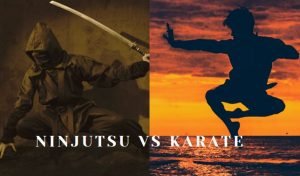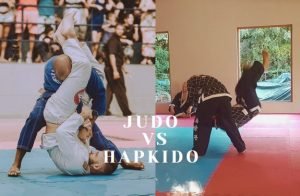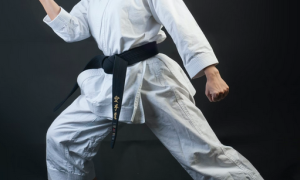
In the realm of ancient Japan, two distinct martial arts, Ninjutsu and Karate, emerged along divergent paths. This article delves into the pragmatic comparison of Ninjutsu vs Karate, shedding light on their contrasting nature.
Ninjutsu, developed for espionage and guerilla warfare, found its application in the covert strategies of medieval ninja assassins. In contrast, Karate evolved from Okinawan self-defense arts into a structured practice with defined stances, forms, and controlled responses.
This article thoroughly analyzes the key differences between Ninjutsu and Karate, encompassing their history, purpose, and strategic approaches. By the end, you’ll gain insights to discern which martial art aligns best with your preferences and objectives.
Table of Contents
Toggle![]()
Ninjutsu and Karate: History and Philosophy
Ninjutsu emerged during feudal Japan as a unique approach to warfare, espionage, and guerrilla tactics, distinctively employed by secretive ninja clans. This artistry gradually evolved into a survival-oriented martial practice, finely tuned for self-defense. Its curriculum encompassed a multifaceted skill set, encompassing techniques like disguise, escape maneuvers, sabotage, and the art of silent combat.
In contrast, Karate traces its origins to martial arts cultivated in the Okinawa islands, later refined into a systematic discipline in Japan. At its core, Karate embodies a refined philosophy of combat and self-improvement. This evolution emphasized precise techniques, including an array of striking methods (mainly kicks and punches), foundational stances referred to as “dachi,” meticulously choreographed forms known as “kata,” and effective defensive maneuvers referred to as “uke.”
Both Ninjutsu and Karate reached prominence in the 20th century, garnering attention from enthusiasts worldwide. They stand as testaments to the enduring appeal of martial arts, drawing students from diverse backgrounds into their rich histories and distinctive philosophies.
Philosophy and Purpose
| Ninjutsu | Karate |
|---|---|
| Developed for practical spying and self-defense | Aims to improve character through martial arts |
| Rooted in Tactical Strategy | Strong Emphasis on Philosophical Growth |
| Anchored in Survival Instincts | Fosters Self-Discipline and Confidence |
The core philosophies differ significantly:
- Ninjutsu adopts a pragmatic approach, with techniques designed for actual combat and covert operations.
- Karate emphasizes personal growth through the perfection of stances, forms, and strikes. Training builds concentration, balance, and respect.
![]()
Ninjutsu vs Karate: Training and Techniques
The training methods and techniques in ninjutsu and karate differ significantly:
| Ninjutsu Training | Karate Training |
|---|---|
| Adaptability and improvisation emphasized | Strict adherence to stances, forms, strikes and blocks |
| Focuses on acquiring diverse specialized skills | Precise repetition to perfect individual techniques |
| Disguise, infiltration, survival skills, sabotage | Kata are pre-arranged patterns of movement |
| Unconventional tactics for different scenarios | Strong emphasis on focus and body control |
| Versatility and environmental awareness | Step-by-step progression from beginner to advanced |
| Unpredictable movements | Disciplined practice for precision |
| Weapon usage like swords, throwing stars, staves | Unarmed techniques like punching, kicking, blocking |
| Low, mobile stances | Deep, rooted stances for power |
| Rolling, jumping, evasive maneuvers | Linear movements and tight technique |
Ninjutsu thrives on adaptability, teaching unpredictable movements, infiltration, and survival skills. Practitioners become versatile warriors, mastering evasion and environmental awareness. Karate, in contrast, follows a disciplined progression. It hones precise strikes, blocks, and kata through endless repetition. This yields controlled power and a focus on linear movements. While Ninjutsu equips for versatile combat, Karate emphasizes mastery through disciplined precision.
![]()
Ninjutsu vs Karate: Combat Strategies
When it comes to combat strategies, both Ninjutsu and Karate showcase distinctive approaches that reflect their core principles and intended applications.
| Ninjutsu | Karate |
|---|---|
| Deception, stealth, surprise attacks | Controlled, conservative movements |
| Evasion and escape tactics | Strong stances and footwork |
| Environment-based flexibility | Direct blocks and counterattacks |
Ninjutsu practitioners excel in utilizing the environment to their advantage. This strategy involves creative use of disguises, secret weapons, and well-timed distractions. Evasion and escape tactics further emphasize the ninja’s ability to control engagements and remain elusive when necessary. By seamlessly blending with their surroundings, Ninjutsu practitioners harness the element of surprise to gain the upper hand.
In contrast, Karate revolves around methodical and controlled tactics. The art’s emphasis on strong stances, meticulous footwork, and disciplined techniques showcases the power of precision. Karate practitioners maintain distance and utilize well-executed blocks and counterattacks. This calculated approach relies on the practitioner’s ability to maintain a poised posture, ensuring every movement is purposeful and effective.
![]()
Ninjutsu vs Karate: Key Comparisons
When contrasting Ninjutsu and Karate, it’s evident that these martial arts stand apart in notable ways while sharing some common traits.
Similarities
- Both martial arts originate from Japan, carrying the legacy of its ancient warrior traditions.
- Both emphasize honing hand-to-hand combat skills, allowing practitioners to excel in close-quarters engagements.
- They share some weapon techniques, like staffs, showcasing the breadth of their training.
- Full-body and mental discipline are integral to both arts, shaping practitioners into focused and balanced individuals.
Differences
- Karate enjoys widespread recognition, while ninjutsu remains more niche and lesser known.
- Ninjutsu embraces irregular tactics adaptable to various scenarios, whereas karate relies on structured kata, pre-set forms of movement.
- Ninjutsu incorporates weapon skills, spanning from swords to shurikens, while karate predominantly focuses on unarmed techniques.
- Ninjutsu aims to adapt to changing circumstances, while karate seeks to achieve technical perfection in each movement.
Ninjutsu vs Karate: Pros and Cons
| Ninjutsu | Karate | |
|---|---|---|
| Pros | – Excellent for real-world self-defense – Fosters adaptability and unpredictability – Broad skillset beyond fighting – Develops situational awareness |
– Builds character, discipline and respect – Safer training methods and sparring – Clear curriculum for all levels – Lots of tournaments to test skills |
| Cons | – Less emphasis on character building – Dangerous techniques restrict safety – Fewer competition opportunities – Hard to find authentic instruction |
– Less effective for uncontrolled real-life attacks – Limited adaptability due to rigid stances – Focuses solely on unarmed techniques – Kata lack realistic combat simulation |
In summary Ninjutsu thrives on adaptability, though at times, its approach might be perceived as extreme. In contrast, Karate upholds a controlled methodology that may appear narrower. Each art boasts a unique array of strengths and limitations that reflect the distinct philosophies embedded within them.
![]()
Choosing between Ninjutsu and Karate
Choosing between ninjutsu and karate ultimately depends on your personal goals and interests when it comes to martial arts training. Those drawn to ninjutsu tend to be seeking practical self-defense abilities that will be effective in real-world uncontrolled situations. The unconventional tactics and adaptable mindset of ninjutsu provides great preparation for responding to unexpected threats or attacks. So for someone focused on hardcore combat-readiness, ninjutsu may be the better fit.
On the other hand, those who gravitate to karate usually care more about the introspective, spiritual journey that traditional martial arts promise. Karate’s strict adherence to stances, forms, and sparring develops strong character, discipline, and respect – along with excellent physical conditioning. The school environment also makes karate training much safer, especially for younger students. So for those seeking personal growth within a structured training framework, karate is likely the way to go.
There are also practical considerations like the availability of quality instruction in your area. Researching schools and introductory classes can provide insights into differences in teaching approach and student composition. Take time to reflect on your temperament as well. Ninjutsu requires comfort with high-intensity training, while karate demands patience for repetition and minute details. And of course, your underlying passion for Japanese martial arts history and culture may steer you toward one or the other. Both arts have profound origins worthy of respect.
![]()
FAQ
![]()
Is Ninjutsu Offensive or Defensive?
Ninjutsu harmoniously blends both offensive and defensive strategies. This ancient art encompasses stealth tactics for surprise attacks and covert offensives, while also emphasizing defensive maneuvers such as escape and evasion. The ninja’s adaptability enables a seamless shift between offensive and defensive postures, dictated by the situation at hand.
Do People Still Teach Ninjutsu?
Certainly, ninjutsu continues to be actively taught in contemporary times. Various modern schools offer comprehensive training in ninjutsu, catering to fitness enthusiasts and those seeking practical self-defense skills. The art has evolved beyond its historical context, transforming into a holistic combat martial art that integrates traditional techniques with contemporary applications.
Is it Ninjutsu or Ninjitsu?
The correct term is ninjutsu. While it’s commonly mistaken as “ninjitsu,” the accurate pronunciation is ninjutsu. The confusion arises due to the subtle similarity in sound between the two. Both terms, however, allude to the specialized skills of the ninja, ancient practitioners of spy craft within the samurai elite. The ninja, also known as shinobi, served as the historical counterpart to modern Special Forces, employing their unique skills for strategic purposes.
![]()
Conclusion
Ninjutsu and karate offer very different experiences while sharing roots in ancient Japanese martial arts. Ninjutsu provides unconventional combat adaptability. Karate focuses on mastering formal techniques and mindset. Your personal preferences and goals will determine which one is better suited for you. Try out both to discover the right fit!
Also consider checking out our comparison between Tai Chi and Karate.


